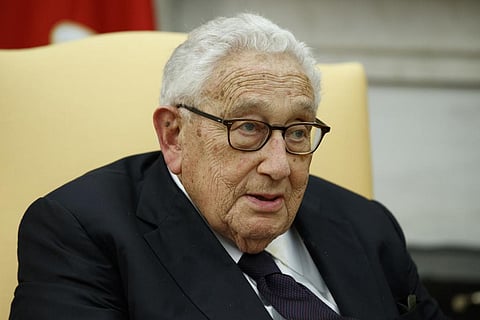

Hello, my name is Henry.” I met Henry Kissinger a half-dozen times over nearly as many decades and he introduced himself in the same way each time. Kissinger took India seriously, regularly visited the country and met Indian delegations who visited the US. Yes, this was partly because of his consultancy Kissinger Associates. The real source of his India interest, however, was that this was a large country and, in his world vision, large countries mattered.
Kissinger believed that global stability was derived from thrashing out agreements between great powers that satisfied their most naked interests and reconciled their power differentials. Amorphous concepts like equity or morality were impossible to reconcile among nations and were best banished from the tables of diplomacy. He wasn’t wrong. But it is hard for a megaphone-armed activist to understand how much the social stability that allows him to burn effigies was dependent on a Kissinger clones working to maintain the balance of power.
In practice, this meant Kissinger sacrificed East Bengalis on the path to US-China rapprochement, bombed Cambodia into the age of Pol Pot, wined and dined more dictators and tinpot types than most people can name. His argued that doing the dirty ultimately secured a larger world order and global peace. An admirer of Kautilya, he wrote of him and the Arthashastra, “He describes a collection of states…in permanent conflict with each other…his is an analysis of the world as he found it; it offers a practical, not a normative, guide to action.” Which echoes what Kissinger believed he did most of his life.
During his twilight years, Kissinger poured his energies into preventing a US-China conflict. As he said to a small group of us, “The US believing China is determined to drive it from the Western Pacific or China believing the US is determined to contain it. If either one of these propositions becomes policy, conflict is inevitable.”
Yet, he was a former US national security advisor and secretary of state, and preserving the interests of his homeland was front and centre. Which is one reason he became a strenuous supporter of the burgeoning Indo-US strategic relationship. “India will be the fulcrum of 21st century order: an indispensable element,” he wrote. In private, he was fulsome about the importance of India and the US and helping preserve the balance of power against China. One was always struck how Kissinger was upheld by diplomats, politicians and businessmen from nearly every country as a genuine statesman, a person who could connect the dots and make them into bridges.
A Jewish refugee from Nazi Germany, he understood the link between domestic politics and international relations. In 2015, Kissinger was invited to speak to the National Security Advisory Board. Asked what he saw as the fundamental question regarding India’s future, he said, “Like all countries that undergo urbanisation, India’s rural value structure is being eroded. The nature of the new value system that your country constructs is the most critical question for your future.”